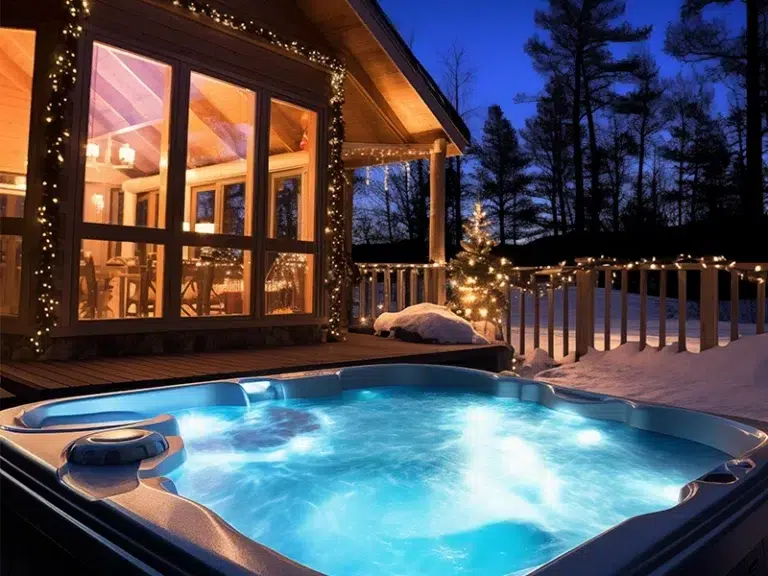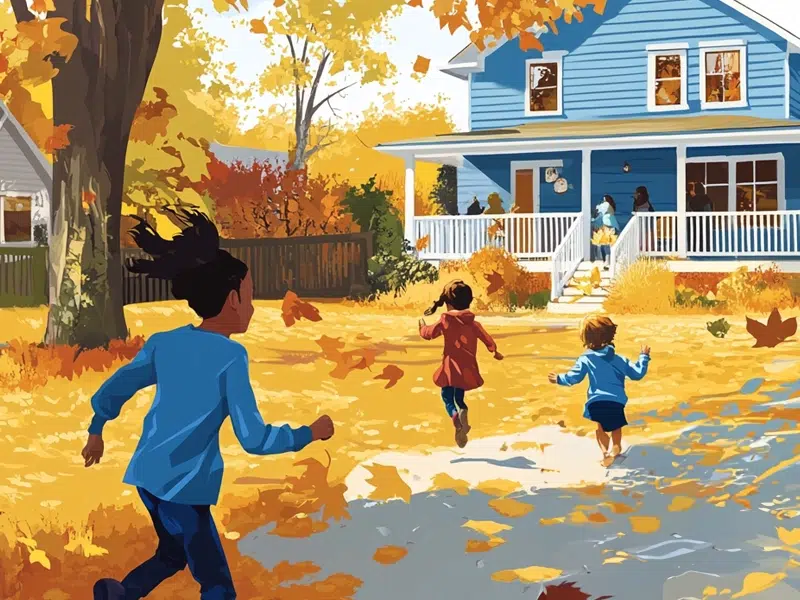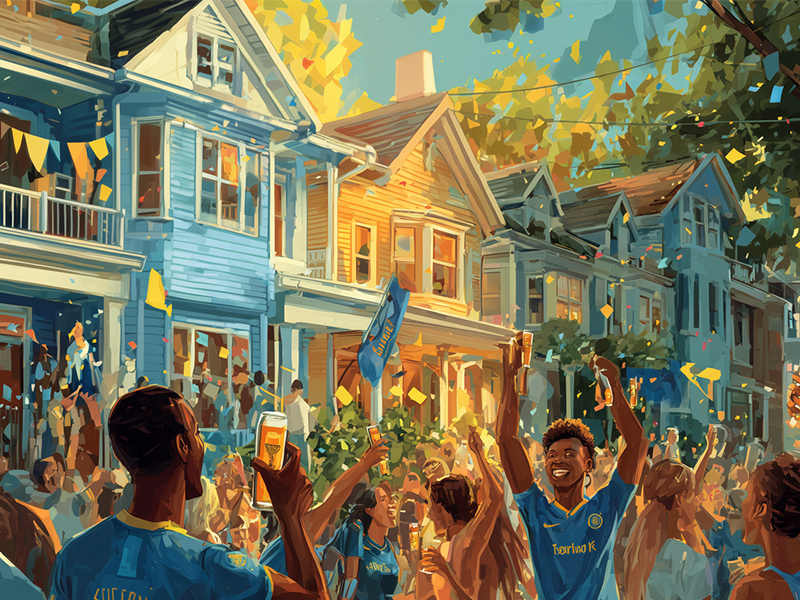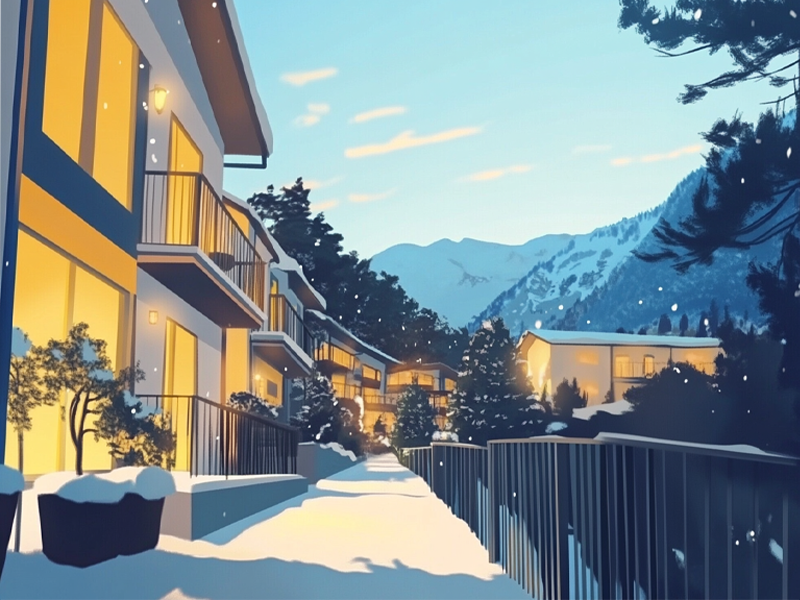Achieve Cold-Season Success: Prep Your Short-Term Rental for Winter
Winter is a special time for short-term rentals, offering guests the chance to escape into snow-covered landscapes and enjoy festive seasonal activities. But for short-term rental hosts, the chilly season also brings heightened responsibilities. From icy walkways and freezing pipes to gaps in Airbnb insurance, the risks of hosting a short-term rental in winter are as real as its charm.
Being an Airbnb host comes with risks year-round, especially guest injury liability. But winter adds new liability risks associated with that cold, icy holiday vibe we all love so much, but also risks like vacancy! Nobody’s driving out to your gorgeous mountain cabin in a natural disaster.
Taking the time to prepare your short-term rental for winter and ensure you’re not misinsured protects not just guest safety and comfort, but also your home and your pocketbook.
- How To Winterize Your Home Before Guests Arrive
- Indoor Guest Safety During Winter Conditions
- Offering A Hot Tub Or Sauna? Here Are 5 Things To Consider
- Are you taking on more risks than your policy is prepared for?
- Add Guest Comfort for Winter Airbnb Stays
- Safety First: Minimize Liability Risks During Winter
- Airbnb Host FAQ: “My Vacation Rental Property Will Be Vacant, What Do I Do?”
- Get Peace Of Mind With Proper
- Is Your Short-Term Rental Ready For Winter?
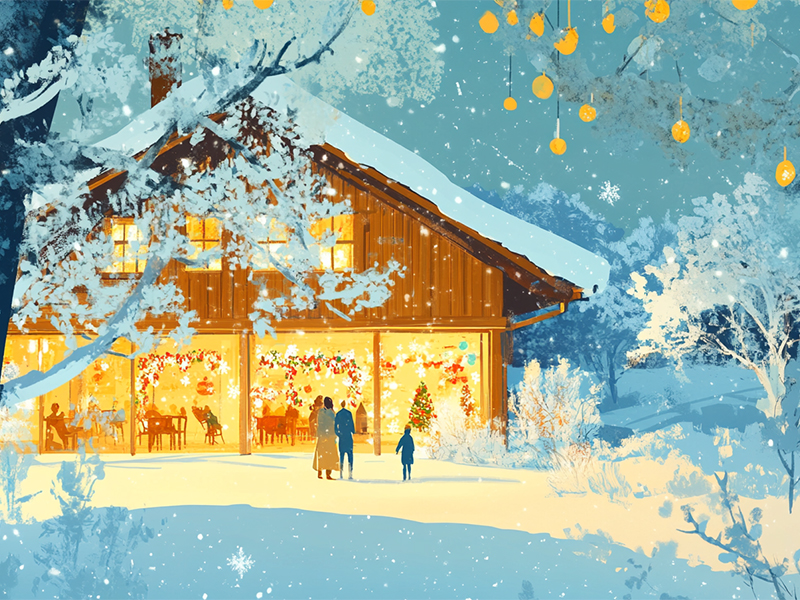
How To Winterize Your Home Before Guests Arrive
Getting your short-term rental safe and winter-ready is key to preserving your property and pockets through the harshest or busiest months. By focusing on essentials like snow removal, proper lighting, clear communication, and protecting critical systems, you’ll stand out as a thoughtful, responsible host, and help avoid costly repairs.
Plan Ahead with Snow Removal at Your Airbnb
When snow piles up, it creates more than just a picturesque winter scene—it also poses significant hazards. Slippery driveways, icy stairs, and snow-covered paths can frustrate guests and lead to dangerous falls. Consider scheduling regular snow plowing, de-icing, and clearing of the driveway, stairs, and walkways before and during guest stays. Pay special attention to steps and entryways, where ice tends to accumulate.
Stock Supplies for Guest Safety: Include Snow Removal Tools
Keep a snow shovel, salt, and de-icing products available, so guests can handle minor snow build-ups themselves if they need to. While guests should not be responsible for regularly shoveling the entire driveway or walking paths, they may need to dig their car out in the instance they are leaving before your snow crew arrives. Extra additions like snow brushes, work gloves, and ice scrapers can help guests access their vehicle easier — another thoughtful addition to keep your guests feeling warm, cozy, and cared for.
Minimize Winter’s Outdoor Airbnb Host Liability Risks
A few moments of extra care provide guests control of their own safety and can prevent accidents and costly on-premise winter Airbnb liabilities. This is not only because you’re preventing guest injury by prepping correctly, but also because those supplies provide guests extra resources.
Winterize Home Plumbing to Prevent Pipes from Freezing
Pipes are among the most vulnerable parts of your property during freezing weather, especially in places with prolonged cold periods. Repairing burst pipes isn’t cheap, not to mention the possible damage to your property, guest experience, and guests’ belongings. To prevent burst pipes and winterize water pipes, here are a few steps every Airbnb host should take:
- Insulate exposed pipes by wrapping foam insulation or heat tape around pipes in the basement, garage, and crawl space to keep these systems warmer.
- Maintain a minimum temperature. Set the thermostat to at least 55°F, even if the short-term rental is vacant, to prevent freezing inside the property.
- Ensure all windows and doors are sealed properly to reduce drafts (and save on your heating bill, too).
- It’s not a bad idea to have a local plumber on call for emergencies at your Airbnb, either.
Airbnb Host FAQ: “Can I Use Antifreeze In Plumbing?”
Yes and no—you can use antifreeze to winterize your home plumbing—but is not recommended for short-term rental properties with regular tenancy. RV or other non-toxic antifreeze is often used to protect pipes in vacant properties where the water is fully drained, and the plumbing system is not in use. However, in active short-term rentals where guests will need running water, antifreeze isn’t a practical option.
Using antifreeze in plumbing may be a practical solution for homes that remain unoccupied for extended periods during the winter, but it poses significant health, safety, and logistical risks for short-term rental owners who must maintain a clean, tenant-ready water supply. If you know you’re facing a stretch of time where your Airbnb is empty, non-toxic antifreeze is a great way to enhance the protection your Airbnb vacancy insurance coverage provides.
However, in active short-term rentals where guests will need running water, antifreeze isn’t a practical option.
Winterize Outdoor Faucets & Prep Indoor Faucets
When preparing your plumbing for winter, don’t overlook the importance of safeguarding both outdoor and indoor faucets. Start by shutting off the water supply to exterior spigots and draining any garden hoses. This prevents residual water from freezing, expanding, and potentially causing pipes to crack. Covering outdoor faucets with insulated covers adds an extra layer of protection against freezing temperatures.
Consider turning indoor faucets to a slow drip during extreme cold snaps between guest stays. This simple yet effective trick helps keep water moving through the pipes, reducing the chance of freezing and lessening the risk of costly damage. But don’t forget to turn the indoor water back on before your guests arrive! Having guests arrive at an Airbnb with no running water isn’t going to get you that Super Host status.
The Ultimate Winter Prep Guide for STR Hosts
A checklist to get your short-term rental winter-ready for guest safety, legal compliance, and peace of mind.
Illuminate Dark Winter Nights with Extra Outdoor Lighting
Long winter nights make proper outdoor lighting necessary. Not only does lighting improve safety, but it also creates a welcoming ambiance for guests arriving after dark. Adding lights along pathways and stairwells, near entry doors, and around parking areas ensures guests can see where they are headed.
Remember that your guests are in an unfamiliar-to-them home and are not used to the quirks of the property like where the sidewalk may have a steeper-than-usual edge or where the patio comes to an end. Don’t forget to check all outdoor light fixtures between each guest stay to ensure they are functioning. For lights that shine brighter and last longer in cold-weather conditions, opt for LED lights as an upgrade–it’ll also save on energy use.
Stock & Label Cold-Weather Emergency Supplies
Unexpected power outages or severe weather can catch guests off guard, especially those unfamiliar with winter conditions. By providing a well-rounded kit of emergency supplies, you’ll put their minds at ease and minimize potential issues. You should have an emergency kit available to your guests year-round, but in wintery places, it should have a few extra things.
Every Airbnb host should provide an emergency kit that includes safety essentials like:
- Flashlights with extra batteries
- First-aid kits
- A supply of bottled water and pre-packaged non-perishable snacks
- Fully charged or solar power banks with cords for electronics
- A list of contact information for local emergency services
- A hand-crank radio or battery-powered weather radio
- Extra woolen blankets or an emergency heat blanket
Don’t forget to clearly label where emergency supplies can be found in your Airbnb safety guide to avoid unnecessary stress for your guests during unpredictable winter events. Set a reminder to check your emergency supplies regularly to ensure nothing has been used or needs to be replaced between guests.
Indoor Guest Safety During Winter Conditions
Winter comes with its own set of challenges, and as a short-term rental host, addressing these proactively ensures the safety and comfort of your guests and is part of meeting basic safety standards as a short-term rental owner. Addressing ways to keep your property safe not only minimizes liability risks from on-premise accidents but can help ensure your guests enjoy their stay without incident.
Indoor Airbnb Winter Safety Tips
Slick driveways and icy stairs are common winter hazards for short-term rentals – but what about once guests are inside? Melting snow and ice on the bottom of shoes can create a landscape for accidental falls and trips, affecting both your guests and you, in the case that there’s injury and your current policy doesn’t cover commercial liability.
Using non-slip mats or rugs that lay flat near entry points to absorb melting snow can keep floors dry and clean, helping to prevent guest injuries at your Airbnb. As an extra precaution, rug tape can be a great way to keep the edges of your rugs lying flat and help lessen the risk of tripping.
Consider placing a boot tray or coat rack near the entrance to give guests an easy way to remove wet footwear, reducing the risk of slippery floors and potential falls.
Understand Hot Tub Safety During Winter
While some of the risks of hot tubs exist year-round, there are special considerations to make during winter weather to prevent slips around hot tubs. Wet feet, cold ground, and quick-freezing water can be a recipe for disaster in terms of hot tub guest safety during the winter. Adding a hot tub safety rail and grip tape to hot tub stairs, rubber mats or non-slip rugs around the amenity, and adequate lighting to and from the hot tub can help prevent an on-premise slip-and-fall.
Guest Communication in Winter
Clear and proactive communication is key to navigating winter-specific challenges and guiding guests to a safe, enjoyable stay.
Airbnb Safety Tips for Before Guests Arrive
Provide detailed check-in and check-out instructions tailored to winter conditions. Include directions on navigating snowy roads leading to your property or guidance on what footwear to bring to make guests’ stay more comfortable. If your short-term rental is in a region prone to heavy snowfall, recommend that guests arrive during daylight hours to avoid navigating unfamiliar terrain in the dark.
Airbnb Safety Instructions for Winter Vacation Rentals
Inside the rental, write clear, direct safety instructions that are easily found. Leave detailed guidance on key winter features, like how to properly use heating systems. Remind guests of any cold-weather and safety precautions, like how to operate devices or where the fire extinguisher is located.
It’s also a good idea to post visible winter rules for short-term rental guests, such as not walking barefoot on icy decks, disallowing glass containers near the hot tub, and encouraging use of handrails where needed. You want to minimize your host liability risks for guest injury – there’s no such thing as too many labels, too detailed of a guest safety guide, or too comprehensive of a short-term rental insurance policy.
Offering A Hot Tub Or Sauna? Here Are 5 Things To Consider
Are you taking on more risks than your policy is prepared for?
Add Guest Comfort for Winter Airbnb Stays
After safety has been addressed, it’s time to think about the comfort and enjoyability of your space so you can get those 5-star reviews. Thoughtful additions and seasonal touches don’t just create comfort—they add value to your short-term, mid-term, or vacation rental property, helping you stand out amidst winter competition.
Offer Complimentary Winter Gear
Sometimes, it’s the little things that leave the biggest impressions. Providing complimentary winter gear can make your rental property feel like a well-stocked sanctuary. An easy win is to supply a charming basket of hand warmers, soft woolen socks, and warm gloves. Make sure clothing items are unopened and in original packaging for each guest. You might also include practical items like umbrellas or rain ponchos by the door, ensuring guests are ready for the elements without hassle.
Provide Heated Amenities, Warm Blankets & Throws
Place soft, inviting blankets on couches and beds to encourage relaxation. High-quality heated throw blankets in living spaces can be a thoughtful touch for those planning long nights of movie marathons or warming up after cold-weather fun.
Spruce Up Your Welcome With A Hot Drink Welcome Kit
Creating a cozy atmosphere can make your short-term rental truly unforgettable, and a hot drink station is a great way to do that. Include pre-packaged hot chocolate, tea, marshmallows, cinnamon sticks, peppermints, or local coffee to turn your Airbnb or vacation rental into a welcoming retreat.
These small but intentional details cater to various tastes and support the idea of a cozy vacation rental experience. To add a practical touch, include reusable travel mugs or eco-friendly insulated cups with lids, so guests can take their favorite hot drink on the go (without the mess!).
If you’d like to include alcoholic drinks at your short-term rental like local wines or spirits, it’s important to make sure that your insurance policy does not exclude liquor liability as this is a common exclusion found in Homeowners and Landlord policies. As a host, you can be found negligent for accidents involving liquor at your property whether it was supplied by you in a welcome basket or even just an overlooked stash left behind by the last guests. There is one comprehensive short-term rental policy that includes liquor liability as well as other necessary liability coverages for Airbnbs.
Provide A Local Winter Activity Guide
Winter travel often means guests will be exploring a new area cloaked in snow. Including a guide to local winter activities like tree-lighting ceremonies, winter markets, ice skating rinks, and snowshoeing trails can help your guests enjoy the season to the fullest—and associate their delightful experience with your short-term rental.
Start by researching nearby attractions and add lesser-known gems, like scenic winter walks, local cafes with seasonal drinks, or spa facilities offering post-ski recovery. Format it in an easy-to-navigate way, such as a booklet, table of QR codes, or an online service like HappyGuest that can be linked in your welcome email or house manual. The extra effort will not only help guests plan their trip but also positions your vacation rental as a dependable hub for enjoying winter wonders.
However, be aware that anything you use to help you market your property could ultimately be used in a liability case against you as the host if your guests get injured while exploring one of the nearby attractions. In our extremely litigious society, you could be found responsible for what happens to your guests or because of your guests even away from your property line. Off-premise liability should be a crucial component of any insurance policy you are considering for your short-term rental business.
Safety First: Minimize Liability Risks During Winter
Winter weather can bring added challenges for short-term rental hosts. Understanding the importance of STR liability insurance and lessening guest liability risks should always be high on your priority list. Protecting your guests and ensuring your property stays safe during icy or snowy conditions not only keeps everyone comfortable but also shields you from potential guest lawsuits against hosts.
Commercial home insurance policies mandate that property owners take “reasonable care” to prevent damage and ensure general safety. This means you’ll need to keep up consistent winter maintenance, including clearing snow and ice, insulating pipes, and preparing your short-term rental for extreme weather conditions.
Proactive care of your Airbnb guests can lessen your risk exposure however at the end of the day accidents happen all the time especially when you take the combination of a revolving door of new people in an unfamiliar-to-them place, who are likely in a relaxed state of mind (aka vacation brain).
Work with your insurance provider to align your STR policy with the risks of your short-term rental or start by verifying your insurance coverage is enough. Avoid being underinsured or misinsured, because either one can leave you out in the cold when a guest gets injured at your Airbnb.
Don’t Provide These Winter Amenities at Your Short-Term Rental (Sorry!)
While you may want to supply sleds or recommend a great nearby lake for ice fishing or skating, it’s important to consider the risks before doing so. Certain winter amenities in your vacation rental can pose unique risks and liabilities that could fall on the property owner and property manager.
Traditional Homeowner’s or Landlord insurance policies cover “Premise Liability Insurance,” which sounds great. However, this does not cover off-premises locations that your guest may explore on amenities provided by the property. That’s why we don’t recommend supplying ice skating gear, sledding equipment, or snow tubes to guests, along with avoiding endorsing these recreational activities.
Recommending local business-managed activities like ice skating rinks or ski lodges, however, can help transfer this liability from your vacation rental business to another commercial entity equipped to handle such safety measures. Customizing your short-term rental insurance to cover off-premise accidents that result in guest injury doubles down on that liability protection.
Airbnb Host FAQ: “My Vacation Rental Property Will Be Vacant, What Do I Do?”
Winter often introduces periods of vacancy in short-term rentals, especially in areas with off-season dips in tourism. With many standard policies, these vacant weeks create coverage pitfalls through vacancy clauses. Most conventional landlord insurance policies have strict limitations once a property is deemed vacant—often after 30 or 60 days—leaving you vulnerable to typically covered damages during quieter months.
Addressing the Vacancy Clause with Year-Round Coverage
Proper Insurance adapts to the unique realities and risks of short-term renting. Whether your vacation property is bustling with winter guests or sitting empty, Proper’s short-term rental policies for Airbnb hosts, vacation rental owners, and rental arbitrageurs ensures you’re covered.
Our vacancy insurance includes physical property protection and liability for incidents that occur during vacancy periods. Even better, if you use your rental personally during these months, your protection remains intact—unlike conventional gaps seen in Landlord and Homeowner policies.
The removal of the vacancy clause in the Proper Insurance policy provides comprehensive, year-round protection even when your property is not occupied. Unlike standard policies that might leave gaps during these periods, Proper Insurance ensures continuous coverage, safeguarding your investment year-round.
Get Peace of Mind with Proper’s Insurance for Loss of Revenue & Equipment Breakdown
Winter preparation helps safeguard your investment, heightens guest safety, and keeps your short-term rental business going strong, even during unforeseen events. But what happens if something goes wrong? Imagine you’ve winterized your rental property, but despite your efforts, a pipe bursts during an unexpected cold snap, rendering the property uninhabitable for weeks or longer.
Without the right Airbnb host insurance in place, you’re not just facing repair costs—you’re also losing vital income during what could have been prime booking weeks. Enter Proper Insurance’s Loss of Business Revenue coverage. Unlike “loss of use” coverage found in standard Homeowner policies, which only replaces housing costs for the owner (and, psst, traditional Homeowner’s insurance doesn’t cover your short-term rental), Proper’s policy is tailored to the business and insurance needs of short-term rental owners and Airbnb hosts.
Our comprehensive host protection covers the actual rental revenue you would have earned during the downtime — without time or payout limits — allowing you to manage expenses while repairs are underway. Whether your bookings are through platforms like Airbnb and Vrbo or happen directly, this coverage bridges the income gap, so you don’t have to worry about covering mortgage payments, utilities, or taxes out of pocket during the time of a covered claim.
Should your electronics or Airbnb amenities require repairs or replacement due to a covered claim, Proper Insurance’s Equipment Breakdown Coverage ensures you can restore your amenities without bearing the financial burden. For example, if your hot tub becomes unusable and its absence affects your rental’s appeal, Proper’s business revenue coverage kicks in. This protects the income you would have earned, ensuring that winter or peak season disruptions don’t put your cash flow at risk.
Is Your Short-Term Rental Ready For Winter?
Proper Insurance doesn’t just address what could go wrong; it proactively supports the things that help your short-term rental thrive in every season. Proactive winter preparations paired with our tailored protection for short-term rental hosts mean fewer disruptions to your income and peace of mind for you as the vacation home owner. While you work to create a cozy, appealing Airbnb experience for guests, Proper stands behind you, filling the gaps that traditional home and rental insurance policies leave exposed.
Policies like comprehensive short-term rental insurance often include these protections, but it’s essential to check the fine print or clarify with your insurer. Verify your short-term rental insurance and make sure you have the right coverage with help from the Super Agents at Proper Insurance.
